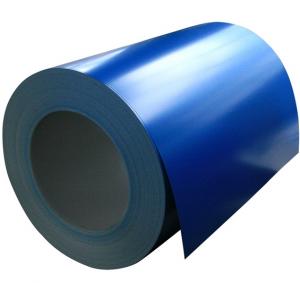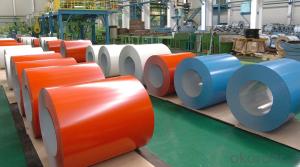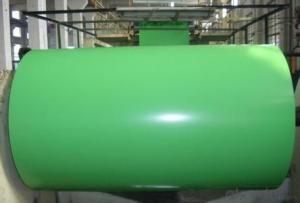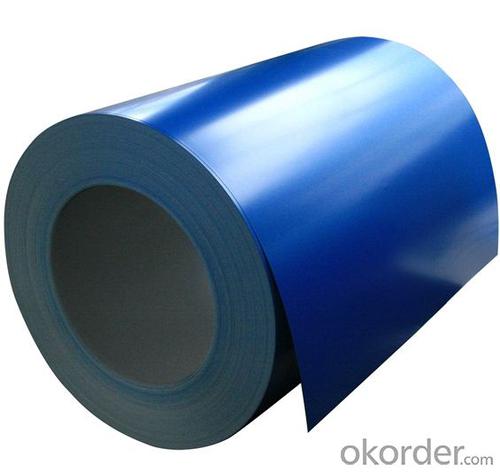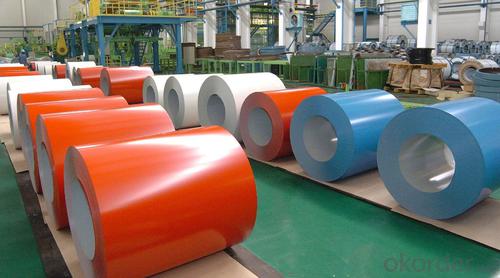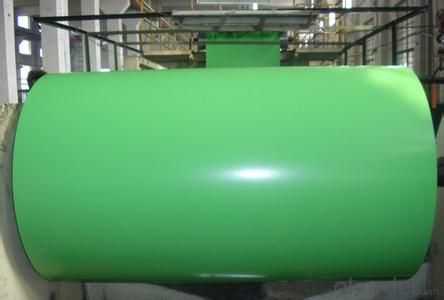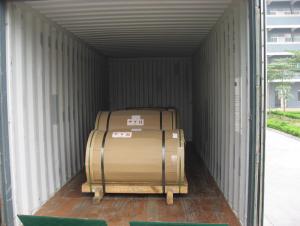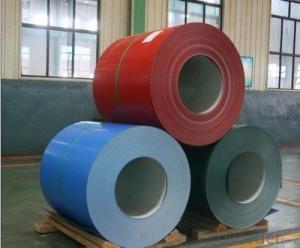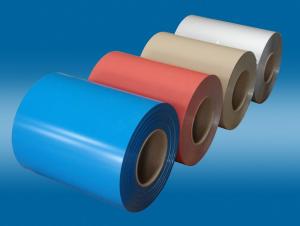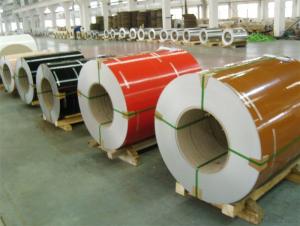Mastic Aluminum Coil 1xxx Prepainted Aluminum Coils
- Loading Port:
- China Main Port
- Payment Terms:
- TT or LC
- Min Order Qty:
- 5 m.t.
- Supply Capability:
- 10000 m.t./month
OKorder Service Pledge
OKorder Financial Service
You Might Also Like
1.Structure of Prepainted Aluminum Coils 1XXX Description
Prepainted Aluminum Coils 1XXX are of a wide range of colors, which give wonderful appearance no matter in residential and commercial constructions or great exhibition centers.
Prepainted Aluminum Coils 1XXX have been widely used in the fields of construction and decoration, electronic applications, lighting decoration, air-condition air pipes, sandwich panels and drainages etc.
2.Main Features of Prepainted Aluminum Coils 1XXX
• Superior quality of raw material
• Reasonable and stable chemical composition
• Accurate tolerance
• Goode mechanical property
3.Prepainted Aluminum Coils 1XXX Images
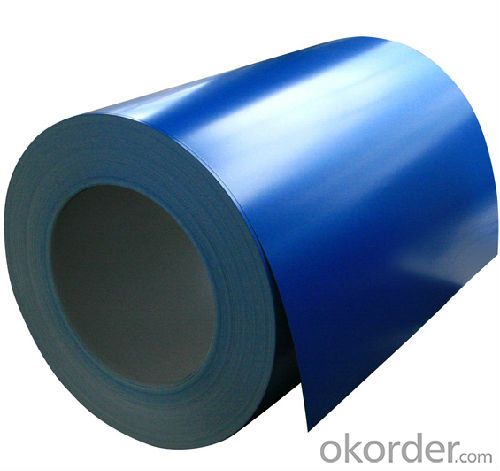
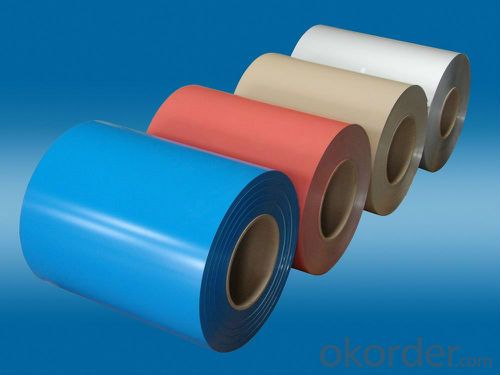
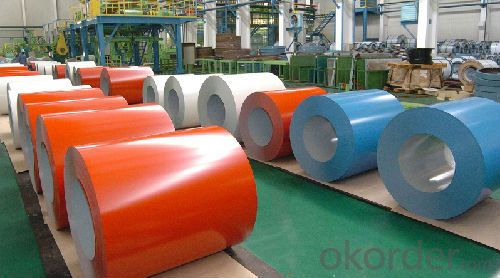
4.Prepainted Aluminum Coils 1XXX Specification
| Alloy | AA1xxx (AA1050,AA1060,AA1070,AA1100 etc.) |
| Temper | H14,H16,H18,H22,H24,H26,H32 |
| Thickness | 0.03mm--30mm |
| Width | 30mm--1700mm |
| Standard | GB/T 17748-1999 |
5. FAQ of Prepainted Aluminum Coils 1XXX
A.How to guarantee the quality?
Customers are welcome to our mill to visit and check the products. Besides, we can arrange a third party to test Prepainted Aluminum Coils 1XXX products.
B.When will you deliver the products?
The Prepainted Aluminum Coils 1XXX will be delivered within 35 days after receiving advanced payment or original L/C.
- Q: Can aluminum coils be used in packaging industries?
- Indeed, the packaging industry can utilize aluminum coils. Aluminum emerges as a favored option for packaging materials owing to its abundant advantageous properties. It possesses a lightweight nature, durability, resistance to corrosion, and exceptional thermal conductivity. Such attributes render aluminum coils appropriate for a variety of packaging applications encompassing food and beverage packaging, pharmaceutical packaging, and cosmetic packaging. Moreover, aluminum stands out as highly recyclable, thereby constituting an environmentally conscious choice for the packaging industry. All in all, aluminum coils deliver remarkable performance and versatility, rendering them a fitting choice for packaging industries.
- Q: Can we provide raw materials, aluminium coils and aluminum panels for several integrated ceilings?
- You go to my space, add my QQ bar, I do aluminum, aluminum coil, aluminum wafer, and I also want to know about the requirements of integrated ceiling ~ ha ha!
- Q: What are the different alloys used for aluminum coils?
- Aluminum coils utilize several different alloys, each possessing unique properties and applications. Some commonly employed alloys encompass: 1. 1100 Alloy: A pure aluminum alloy that boasts exceptional corrosion resistance and high thermal conductivity. It finds frequent usage in scenarios necessitating elevated thermal or electrical conductivity, such as heat exchangers or electrical conductors. 2. 3003 Alloy: A versatile aluminum alloy offering commendable resistance against atmospheric corrosion and moderate strength. It is commonly employed in situations requiring moderate strength and formability, like packaging, roofing, or vehicle parts. 3. 5052 Alloy: Among the strongest non-heat-treatable aluminum alloys, this alloy exhibits top-notch corrosion resistance and favorable formability. It frequently finds application in marine environments, automotive components, and household appliances. 4. 6061 Alloy: A heat-treatable aluminum alloy renowned for its exceptional strength and corrosion resistance. It is often utilized in structural capacities, such as aircraft components, marine hardware, or bicycle frames. 5. 7075 Alloy: A high-strength aluminum alloy recognized for its outstanding fatigue strength. It is commonly employed in aerospace and military scenarios, as well as in high-stress structural elements. These examples represent merely a fraction of the diverse array of alloys employed for aluminum coils. The selection of a specific alloy depends on the desired properties and intended application of the coil.
- Q: How are aluminum coils used in the production of heat exchangers?
- Aluminum coils are commonly used in the production of heat exchangers due to their excellent thermal conductivity and corrosion resistance properties. The coils are typically formed into a serpentine shape and attached to the heat exchanger casing. This allows for the efficient transfer of heat between the two fluids being exchanged, as the aluminum coils provide a large surface area for heat transfer. Additionally, the use of aluminum coils helps to reduce the overall weight of the heat exchanger, making it more cost-effective and easier to install.
- Q: What are the different yield strengths of aluminum coils?
- The yield strengths of aluminum coils can vary depending on the specific grade and temper of the aluminum. Generally, the range of yield strengths for aluminum coils can be anywhere from 15,000 to 75,000 pounds per square inch (psi).
- Q: What is the reason for the grooves that go around the circumference of a tin/aluminium can? It can't be for grip because they're covered with paper anyway and i don't think it would make much difference.
- If they didn't, they would easily be crushed during shipment. It makes them much stronger to have the grooves. Norrie's got a good point.
- Q: This question asks for the uses or applications of aluminum coil in various industries or contexts.
- <p>Aluminum coil has a wide range of applications due to its lightweight, corrosion resistance, and high thermal conductivity. It is commonly used in construction for roofing and siding, in the automotive industry for parts and heat exchangers, and in the packaging industry for food and beverage cans. Additionally, aluminum coil is utilized in electrical applications such as transformers and electrical wiring due to its excellent conductivity. It is also employed in the manufacturing of household appliances, furniture, and various consumer goods. The coil's malleability makes it suitable for forming into various shapes and sizes, enhancing its versatility across different sectors.</p>
- Q: why do we use copper more than aluminum? give some characteristic of copper that makes it better then aluminum?
- Copper is: -harder to oxidize -more ductile -better conductor of electricity -has a longer 'lifespan'
- Q: Are aluminum coils suitable for low-maintenance roofing applications?
- Yes, aluminum coils are suitable for low-maintenance roofing applications. Aluminum is highly resistant to corrosion, lightweight, and durable, making it an ideal material for roofing. It requires minimal maintenance, as it does not rust or rot like other metals. Additionally, aluminum roofs are known for their longevity and ability to withstand harsh weather conditions, further reducing the need for maintenance.
- Q: What are the standard sizes of aluminum coils?
- The standard sizes of aluminum coils vary depending on the manufacturer and application, but common sizes range from 0.008 inches to 0.25 inches in thickness and 12 inches to 60 inches in width.
Send your message to us
Mastic Aluminum Coil 1xxx Prepainted Aluminum Coils
- Loading Port:
- China Main Port
- Payment Terms:
- TT or LC
- Min Order Qty:
- 5 m.t.
- Supply Capability:
- 10000 m.t./month
OKorder Service Pledge
OKorder Financial Service
Similar products
Hot products
Hot Searches
Related keywords
